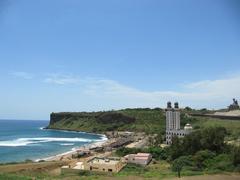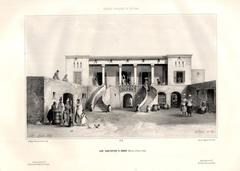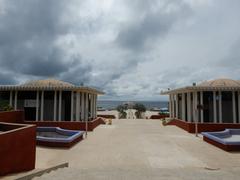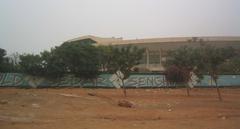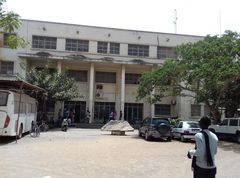Dieuppeul-Derklé Visitor Guide: Hours, Tickets, and Historic Exploration in Dakar, Senegal
Date: 04/07/2025
Introduction
Dieuppeul-Derklé, a vibrant commune d’arrondissement centrally located in Dakar, Senegal, invites visitors to immerse themselves in authentic Senegalese life. Known for its dynamic markets, colorful street art, and the warmth of its residents, the neighborhood exemplifies the spirit of “teranga”—Senegalese hospitality. Whether you’re eager to delve into post-independence history, savor local cuisine, or explore nearby cultural landmarks, Dieuppeul-Derklé is an ideal gateway to Dakar’s rich urban tapestry.
Table of Contents
- Introduction
- Historical Overview
- Neighborhood Life & Social Fabric
- Culture, Festivals, and Art
- Markets, Economy, and Cuisine
- Visiting Dieuppeul-Derklé: Practical Information
- Safety, Health, and Visitor Tips
- Accessibility & Transportation
- Accommodation & Local Services
- Money, Banking, and Common Scams
- Language & Communication
- Emergency Contacts
- Best Seasons to Visit
- Visuals and Interactive Tools
- Frequently Asked Questions (FAQ)
- Useful Links & Resources
- Conclusion
Historical Overview
Origins and Growth:
Dieuppeul-Derklé was once two distinct neighborhoods that merged with Dakar’s urban expansion in the 20th century. Its development accelerated in the post-independence era, particularly under President Léopold Sédar Senghor, when it became a favored residential area for government officials.
Community Evolution:
The area experienced significant population growth in the 1960s and 70s, leading to a blend of planned and informal settlements. Today, it is home to nearly 40,000 residents from diverse backgrounds and professions, with a social fabric woven through family ties, religious associations, and active community organizations.
Cultural and Political Role:
Dieuppeul-Derklé remains influential in Dakar’s political and cultural life, nurturing notable public figures and supporting a variety of secular and Islamic community centers.
Neighborhood Life & Social Fabric
Dieuppeul-Derklé’s streets are animated by day-to-day commerce, communal gatherings, and intergenerational households. Elders often serve as advisors, while women and youth play central roles in organizing events, sports tournaments, and literacy classes.
Neighborhood life flourishes through:
- Morning and evening gatherings: Children play football in open lots, adults meet in cafés or under trees to discuss current events.
- Religious and social events: Festivals and family celebrations unite residents and reaffirm community bonds.
Culture, Festivals, and Artistic Expression
Religious Celebrations:
The predominantly Muslim community observes major Islamic holidays like Tabaski (Eid al-Adha) and Korité (Eid al-Fitr) with communal prayers, feasting, and acts of charity.
Art and Music:
Dieuppeul-Derklé is a hotspot for artistic expression, hosting mural projects during the Dakar Street Art Festival (Secret Attractions - Dakar Hidden Gems). Music—especially mbalax—resonates during weddings, naming ceremonies, and community events, often accompanied by drumming circles and dance.
Community Events:
International Women’s Day (March 8th) is celebrated with speeches and performances, reflecting the important role of women in local society (Commune de Dieuppeul-Derklé).
Markets, Economy, and Cuisine
Local Markets:
The neighborhood’s markets, such as Castor Market, operate from 7:00 AM to 6:00 PM and offer fresh produce, textiles, and crafts. Proximity to HLM Market makes it convenient for sourcing Senegalese fabrics (Travel-Tramp).
Economic Life:
Women manage many market stalls, run eateries, and participate in cooperative savings groups (tontines).
Cuisine:
Popular dishes include:
- Thieboudienne: Fish, rice, and vegetables in tomato sauce
- Yassa Poulet: Marinated chicken with onions and lemon
- Fataya: Fried fish or meat pastries
Cooking is often communal, and visitors can join food tours or cooking classes for a hands-on experience (National Traveller).
Visiting Dieuppeul-Derklé: Practical Information
Neighborhood Access:
Dieuppeul-Derklé is open to the public year-round, with most activity from 8:00 AM to 6:00 PM. There are no entrance fees.
Attractions & Landmarks:
- Allées Khalifa Ababacar SY: Promenade for leisure and people-watching
- Castor Market: Bustling hub for shopping and community interaction
- Nearby Sites: Hann Forest and Zoological Park, Stade Léopold Sédar Senghor, Museum of Black Civilisations, and Massalikoul Djinane Mosque (Mapcarta)
Guided Tours:
Local tour operators and community guides offer walking tours focused on street art, markets, and neighborhood history. Booking in advance is recommended.
Safety, Health, and Visitor Tips
Safety:
Dieuppeul-Derklé is considered safe, but petty theft (pickpocketing, bag snatching) can occur in crowded areas (Xplrverse). Use crossbody bags, avoid displaying valuables, and prefer registered taxis or ride-hailing apps.
Health:
- Drink only bottled or boiled water (Travel Like A Boss)
- Eat at reputable restaurants; be cautious with street food
- Recommended vaccinations: Yellow fever, hepatitis A/B, typhoid, and routine immunizations
- Use mosquito repellent; malaria risk is present but lower than in rural areas
Local Laws & Customs:
- Carry identification at all times (Travel Like A Boss)
- Dress modestly, especially at religious sites
- Public displays of affection are discouraged
Accessibility & Transportation
Getting There:
Dieuppeul-Derklé is accessible via city buses (Liberté 5 terminus), taxis, and “car rapides” minibuses. Ride-hailing apps such as Yango and Heetch are widely used.
Neighborhood Accessibility:
Most main roads are paved and partially accessible to those with mobility challenges, though some informal areas may be uneven.
Proximity to Major Sites:
The area’s central location makes it convenient for day trips to Dakar’s beaches, markets, and landmarks.
Accommodation & Local Services
Where to Stay:
Options range from budget guesthouses to mid-range hotels. Choose accommodations with strong safety reputations and secure facilities.
Local Services:
ATMs are available in major commercial areas. Use machines inside banks or shopping centers for added security.
Money, Banking, and Common Scams
- Currency: West African CFA franc (XOF)
- Credit cards accepted in larger hotels/restaurants; cash is preferred in markets
- Common scams: Overcharging by taxi drivers, unofficial guides demanding high fees, and pickpocketing. Always agree on fares in advance and be firm with aggressive vendors (Travellers Worldwide).
Language & Communication
- French: Official language for business and administration
- Wolof: Widely spoken in daily life
- Learning basic greetings in Wolof (e.g., “Nanga def?”—How are you?) is appreciated
- English is becoming more common among youth and tourism workers
Emergency Contacts
- Police: 17
- Fire Brigade: 18
- Ambulance: 15
- Embassy/Consulate: Register your contact details upon arrival
Best Seasons to Visit
- Dry Season (Nov–May): Best for comfortable temperatures and outdoor activities
- Rainy Season (Jun–Oct): Higher humidity, occasional flooding, but still vibrant with festivals (Travel Like A Boss)
Visuals and Interactive Tools
- Explore Dieuppeul-Derklé on Google Maps
- Use the Audiala app for real-time updates on transport and local events
Frequently Asked Questions (FAQ)
Q: What are the visiting hours for Dieuppeul-Derklé?
A: Public areas are open 24/7, but markets and most attractions are active from 8:00 AM to 6:00 PM.
Q: Are there entrance fees to visit the neighborhood?
A: No, Dieuppeul-Derklé is a public district. Nearby museums or events may have fees.
Q: Is it safe for solo travelers?
A: Generally, yes. Exercise standard urban precautions, especially at night.
Q: What languages are spoken?
A: French and Wolof are most common; English is less prevalent.
Q: Are guided tours available?
A: Yes, local operators provide walking and cultural tours. Book in advance for specialized experiences.
Q: Is Dieuppeul-Derklé accessible for people with disabilities?
A: Main roads and attractions offer partial accessibility; assistance may be needed in informal areas.
Useful Links & Resources
- Official Dakar Tourism Site
- Dakar Public Transport Information
- Local Tour Operators
- Museum of Black Civilisations
- Senegal Embassy in the USA
- Dakar Historical Sites Information
- Secret Attractions - Dakar Hidden Gems
- National Traveller - 10 Things to Absolutely See in Dakar, Senegal
- Travel Like A Boss: Dakar Safety
- Travellers Worldwide: Senegal Safety
- Commune de Dieuppeul-Derklé
- Mapcarta – Dieuppeul-Derklé
Conclusion
Dieuppeul-Derklé encapsulates the heart of Dakar through its lively markets, communal culture, and proximity to historical landmarks. Its accessible location, diverse attractions, and welcoming residents make it a top recommendation for travelers seeking an authentic Senegalese urban experience. By following local customs, safety guidelines, and practical tips, visitors can navigate and enjoy Dieuppeul-Derklé with confidence and respect. For the most up-to-date information, download the Audiala app and consult official resources before your trip.
Immerse yourself in Dieuppeul-Derklé—where the rhythms of Dakar’s past and present meet.
